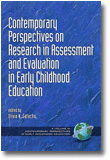
Contemporary Perspectives on Research in Assessment and Evaluation in Early Childhood Education
Edited by:
Olivia Saracho, University of Maryland
A volume in the series: Contemporary Perspectives in Early Childhood Education. Editor(s): Olivia Saracho, University of Maryland.
Published 2015
Researchers, educators, professional organizations, administrators, parents, and policy makers have increased their involvement in the assessment and evaluation of early childhood education programs. This interest has developed swiftly during the last decades. The National Association for the Education of Young Children (NAEYC) and the National Association of Early Childhood Specialists in State Departments of Education (NAECS/SDE) developed a position statement titled, “Early childhood curriculum, assessment, and program evaluation: Building an effective, accountable system in programs for children birth through age 8,” to address related trends, issues, guiding principles, and values. Appropriate and well-designed evaluations need to address several audiences including researchers, educators, policy makers, children, and parents. They need to encourage the implementation of a strong foundation that improves the quality of the children’s education. Child assessment and program evaluation can lead to effective results and better accountability for preschool, kindergarten, and primary school programs. The purpose of this volume is to share a collection of research strands on contemporary perspectives on research in assessment and evaluation in early childhood education. It provides a review and critical analysis of the literature on assessment and evaluation of programs, children, teachers, and settings. The volume begins with a brief introductory chapter that presents the reader with a map of the area, laying out the issues and alternatives, and linking these to the chapters that follow. It addresses several areas including (1) understanding assessment and evaluation with young children, (2) schools and assessment implications, (3) teacher evaluation and professional development, (4) social relationships and assessment, (5) content areas in early education assessment, (6) technology and assessment, and (7) conclusion with future research directions in assessment and evaluation in early childhood education. The volume is of interest to researchers, educators, policy makers, university faculty, graduate students, and general readers who are interested in research on assessment and evaluation in early childhood education. The chapters are authored by established scholars in the field.
CONTENTS
Part I: Introduction: Understanding Assessment and Evaluation With Your Children. Research in Early Childhood Educational Assessment and Evaluation, Olivia N. Saracho. Evaluation in Early Childhood Education, Olivia N. Saracho. Part II: Schools and Assessment Implications. Assessment and School Readiness: Implications for Children, Implications for Schools, Dominic F. Gullo. Assessing School Readiness in Early Childhood: Historical Analysis, Current Trends, Tomoko Wakabayashi and Jeffrey A. Beal. Emergent Curriculum and the Tension Between Relationship and Assessment, Carol Anne Wien, Brenda Jacobs, and Ellen Brown. Part III: Teacher Evaluation and Professional Development. Teacher Effectiveness and Teacher Evaluation in Early Childhood Education Programs, Xianxuan Xu, James H. Stronge, and Leslie W. Grant. Evaluation of Early Childhood Education Environments and Professional Development: Current Practices and Implications, Vasilis Grammatikopoulos, Athanasios Gregoriadis, and Evridiki Zachopoulou. Part IV: Social Relationships and Assessment. Assessment of Caregiver–Child Interactions and Relationships in Infant/Toddler Classrooms, Catherine Tsao and Carollee Howes. Assessing Children’s Peer Relationships in Early Educational and Childcare Settings, Becky Kochenderfer-Ladd and Gary W. Ladd. Play as a Method of Assessing Young Children’s Development and Learning: Past, Present, Future, Doris Bergen. Part V: Content Areas in Early Education Assessment. Early Literacy Assessment and the Importance of Oral Language, Susan E. Hill. Interviewing in Early Childhood Mathematics Education, Elizabeth Dunphy. Assessment of English Language Acquisition in Young Dual Language Learners, Cristina Gillanders and Dina C. Castro. Assessment of Dual Language Learners in Early Education Settings, Eugene E. García. Part VI: Technology and Assessment. Assessment Using Technology: Formative Assessment With Young Children, Douglas Clements, Daryl B. Greenfield, Susan H. Landry, and Julie Sarama. Computer-Based Testing and Young Children, Susan K. Barnes. Assessing Young Children’s Learning in STEM, Susan K. Barnes. Part VII: Conclusion. Future Directions in Assessment and Evaluation in Early Childhood Education, Olivia N. Saracho. About the Editor. About the Contributors.
-
Paperback978-1-68123-152-5
Web price: $74.28 (Reg. 87.39)
-
Hardcover978-1-68123-153-2
Web price: $123.16 (Reg. 144.89)
- eBook978-1-68123-154-9

-
 Contemporary Perspectives on Research in Motivation in Early Childhood Education
Contemporary Perspectives on Research in Motivation in Early Childhood Education
-
 Contemporary Perspectives on Research on Bullying and Victimization in Early Childhood Education
Contemporary Perspectives on Research on Bullying and Victimization in Early Childhood Education
-
 Contemporary Perspectives on Research on Child Care in Early Childhood Education
Contemporary Perspectives on Research on Child Care in Early Childhood Education
-
 Contemporary Perspectives on Research on Child Development Laboratory Schools in Early Childhood Education
Contemporary Perspectives on Research on Child Development Laboratory Schools in Early Childhood Education
-
 Contemporary Perspectives on Research on Coronavirus Disease 2019 (COVID-19) in Early Childhood Education
Contemporary Perspectives on Research on Coronavirus Disease 2019 (COVID-19) in Early Childhood Education
-
 Contemporary Perspectives on Research on Immigration in Early Childhood Education
Contemporary Perspectives on Research on Immigration in Early Childhood Education
-
 Handbook of Research Methods in Early Childhood Education - Volume 2
Review of Research Methodologies
Handbook of Research Methods in Early Childhood Education - Volume 2
Review of Research Methodologies

